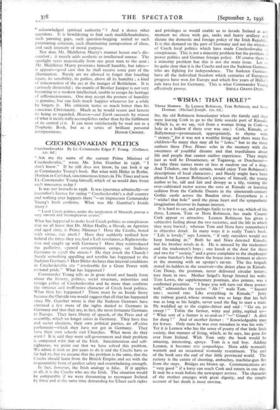CZECHOSLOVAKIAN POLITICS
Czechoslovakia By Lt.-Commander Edgar P. Young. (Gollancz. 12s. 6d.) " Asg me the name of the current Prime Minister of Czechoslovakia," wrote Mr. John Gunther in 1936, " I don't know." If he still does not know, he can look it up in Commander Young's book. But what with Hitler in Berlin, Henlein in Carlsbad, sanctimonious letters in The Times and now Lt.-Commander Young himself, which of us would dare boast such innocence today ?
It was not bravado in 1936. It was ignorance admittedly—or journalist's licence for saying " Czechoslovakia's a dull country and nothing ever happens there "—an impression Commander Young's book confirms. What was Mr. Gunther's Inside Story ?
" Local Czech politics, under the inspiration of Masaryk, pursue a very smooth and inconspicuous course."
What has happened to make local Czech politics so conspicuous that we all know that Dr. Milan Hodka, a Slovak, an Agrarian and aged sixty, is Prime Minister ? Have the Czechs, bored with virtue, run amok ? Have they suddenly realised how behind the times they are, had a Left revolution, a Right revolu- tion and caught up with Germany ? Have they reintroduced the guillotine, opened concentration camps, set Sudeten Germans to scrub the streets ? Do they insult the Church ? Surely something appalling and terrible has happened to the Sudeten Germans ? Herr Hitler declares that internal conditions in Czechoslovakia are " intolerable for a Great Power with national pride." What has happened ?
Commander Young tells us in great detail and handy form about the history, politics, social structure, minorities and ibreign policy of Czechoslovakia and he more than confirms the virtuous and inoffensive character of Czech local politics. What then has happened ? There must be an Inside Story because the Outside one would suggest that all that has happened since Mr. Gunther wrote is that the Sudeten Germans have obtained a few more of the rights denied to Germans in Germany and that they are, in fact, the most fortunate Germans in Europe. They have liberty of speech, of the Press and of assembly, which no longer exists in Germany. They have free and secret elections, their own political parties, an eff!ctive parliament—which they have not got in Germany. They have their own schools and Churches. What more do they want ? It is said they want self-government and their problem is compared with that of the Irish. Sanctimonious and self- righteous, we point out that we have solved this problem. We admit it took us 30o years to do it and the Czechs have so far had 2o, but we assume that the problem is the same, that the Czechs should learn from the British Empire and act with the magnanimity born of perfect safety and overwhelming strength.
In fact, however, the Irish analogy is false. If it applies at all, it is the Czechs who are the Irish. The situation would be comparable if we were threatening to reconquer Ireland. by force and at the same time demanding for Ulster such rights
and privileges as would enable us to invade Ireland at an3 moment we chose with gas, tanks and heavy artillery and dictate the domestic and foreign policy of the Irish Republic. It is this demand on the part of Germany and not the mistakes of Czech local politics which have made Czechoslovakia S..) conspicuous. This is not a minority problem but the problem of power politics and German foreign policy. Of course there is a minority problem but this is not the main issue. Let us be quite clear that it is the Czechs and not the Sudeten Germans who are fighting for independence. The Sudeten Germans have all the individual freedom which centuries of European progress have won for Europe and which five years of Hitler's rule have lost for Germany. This is what Commander Young






































 Previous page
Previous page